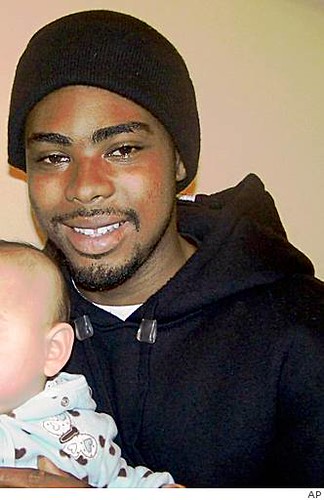
Oscar Grant, 22, was killed by the BART police in Oakland, California on January 1, 2009. The police officer involved has been charged with murder after two weeks of protest and rebellion., a photo by Pan-African News Wire File Photos on Flickr.
Police shut down San Francisco transit station after protests
BART under fire after officials shut off wireless service to avoid protest last week
SAN FRANCISCO — Cell phone service was operating as protesters gathered at a San Francisco subway station during rush-hour several days after transit officials shut wireless service to head off another demonstration.
An estimated 50 protesters gathered Monday afternoon on the Civic Center Station platform chanting "no justice, no peace." They also swarmed a Bay Area Rapid Transit train, trying to prevent its departure.
Law enforcement eventually cleared the platform and closed the station. BART trains went by without stopping.
An officer told the few remaining protesters that the demonstration was unlawful and warned of arrests if people didn't leave within two minutes.
Outcry against cut service
BART officials have said that their decision to cut cell phone service on Thursday was made out of concern for passengers' safety. The move was criticized by the American Civil Liberties Union and others.
"It's wrong," American Civil Liberties Union lawyer Michael Risher, whose group was scheduled to meet later Monday with BART's police chief at the agency's headquarters in Oakland. "There were better alternatives to ensure the public's safety."
Former BART director Michael Bernick applauded the move, saying it ensured a safe and uninterrupted commute Thursday night.
"Finally, BART said enough," said Bernick. "BART put its riders and commuters ahead of these protesters and the ACLU."
The incident last Thursday night helped raise questions about the role that social networks are playing in helping people, from Egypt to London, organize online. In the U.S., with its history of free speech, critics are saying BART's move was unconstitutional.
BART cut power to its wireless nodes Thursday night after learning demonstrators planned to use social media and text messaging to organize a protest against police brutality on one of the subway platforms.
The tactic appeared to work because no protest occurred.
Hacking attack by Anonymous
BART's actions prompted a Federal Communications Commission investigation, and a hacking group organized an attack on one of the agency's websites on Sunday and posted personal information of more than 2,000 passengers online.
The group, named Anonymous, called for a disruption of BART's evening commute Monday.
"We are Anonymous, we are your citizens, we are the people, we do not tolerate oppression from any government agency," the hackers wrote on their own website. "BART has proved multiple times that they have no problem exploiting and abusing the people."
BART spokesman Jim Allison said BART has notified the FBI, and that no bank account or credit card information was listed.
BART officials, meanwhile, defended the shutdown of the cell service as a legal approach to ensure commute safety.
A protest last month on a San Francisco platform calling for the dismissal of the transit officers responsible for the July 3 shooting death of a man wielding a knife prompted the closing of one station and caused system-wide delays during rush hour.
Allison said the wireless outage was only for platforms and trains running under the city, places where protests are banned.
By Monday, a growing number of free speech advocates were calling on BART to renounce the tactic, with many calling the action an unconstitutional attempt to stifle lawful protest. Even a BART board member criticized the action.
"We really don't have the right to be this type of censor," said Lynette Sweet, who serves on BART's board of directors, said. "In my opinion, we've let the actions of a few people affect everybody. And that's not fair."
No comments:
Post a Comment